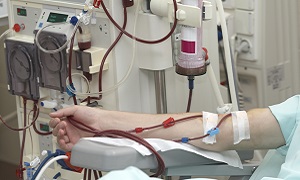Best Doctors in India for Acute Kidney Failure Treatment
Best Hospitals in India for Acute Kidney Failure Treatment
Hospital Highlights:
- Apollo Hospitals is a private healthcare group in India, with its headquarters based in Chennai. Established in 1983 by Dr. Prathap C. Reddy, the group offers a wide range of medical treatments and services across various specialties.
- It is renowned for emphasizing innovation and utilizing cutting-edge medical technologies into patient treatment.
- Known as India’s first corporate hospital, Apollo Hospitals is often credited for pioneering the private healthcare revolution in the country.
- With clinics and hospitals located all throughout India, Apollo Hospitals is a nationwide healthcare organization. Its presence can also be found in foreign countries.
- Preventive health examinations, medical and surgical treatment, and diagnostic centres are just a few of the services that the Apollo group provides.
- The group has several centres of expertise, including Cardiac Sciences, Neurosciences, Orthopedics, Emergency Care, Cancer Care, and Organ Transplantation.
- City: Chennai, India
Hospital Highlights:
- RIMC is a multi-specialty hospital in a sprawling area of 36 acres located in Chromepet, Chennai, Tamil Nadu, India.
- The facility has 450 beds including 130 critical care beds, 9 operating rooms, modern reference laboratories and radiology services, and is conveniently located near road, rail and air transportation.
- RIMC is led and managed by world-renowned physicians committed to healthcare.
- RIMC offers the broadest range of clinical care, education, and research. The hospital offers state-of-the-art technology and modern treatment facilities designed to provide health care at an affordable cost.
- Rela Institute is driven by patient needs, comfort and confidence.
- City: New Delhi, India
Hospital Highlights:
- Fortis Hospital in Shalimar Bagh is a multi-super specialty hospital that strives to provide world-class patient care by leaving no stone unturned.
- Fortis, Shalimar Bagh, with 262 beds and a 7.34-acre footprint, provides the best level of medical care through its team of doctors, nurses, technicians, and management professionals.
- City: Bengaluru, India
Hospital Highlights:
- Established in 2007, the Apollo Hospitals Bangalore is a 300-bed multispecialty hospital situated in Bannerghatta Road, Bangalore.
- Equipped with the state-of-the-art technology, it is a leading hospital dedicated to providing healthcare needs to patients with compassion and expertise.
- It is the first hospital to have completed the highest number of Robot Assisted Heart Surgeries in India.
- Over the years, it has successfully conducted some of the rarest medical procedures such as spinal angiolipoma excision, autologous chondrocyte implantations, and tibial tuberosity shift with MPSL reconstruction.
- The Apollo Hospitals Bangalore has the reputation of performing the greatest series of airway stents in the country.
- Additionally, the hospital is known for providing comprehensive treatment in specialties such as gastroenterology, urology, gynecology, oncology, colorectal surgery, etc.
- The “The Minimal Access Surgery Centre” (MASC), one of Apollo Hospitals, Bangalore’s premier Centres of Excellence, is devoted to the use of minimally invasive surgical procedures.
- In 2013, THE WEEK-A C Nielsen, Best Hospital Survey ranked Apollo Hospitals Bangalore as the 2nd best multi-speciality hospital in Bangalore.
- City: Mumbai, India
Hospital Highlights:
- Gleneagles Global Hospital The 450-bed facility comprises of 17-stories, housing state-of-the-art infrastructure, and advanced medical care facilities.
- The hospital offers end-to-end clinical, surgical, and diagnostic services. It is equipped with a team of eminent medical professionals aided by qualified nurses and medical staff
- The Hospital offers advanced Endoscopic procedures, Hepatobiliary and Liver Surgeries, Surgical and Medical Gastroenterology, Bariatric Surgery, and Robotic surgery.
- The hospital is a center of excellence for Orthopedics, Joint Replacement, Knee Replacement, and Hip Replacement surgery.
- City: Hyderabad, India
Hospital Highlights:
- CARE Hospitals were established in the year 2000, by CARE Group.
- The multispecialty hospital has 435 beds, including 120 critical care beds, with an annual inflow of 180000 outpatients and 16,000 in-patients.
- The hospital provides specialty medical services in Cardiology, Cardiothoracic Surgery, Pediatric Cardiology, Pediatric Cardiothoracic Surgery, Neurology, Neurosurgery, Nephrology, and Urology.
- The hospital has the first dual source, 128 slice CT scanner (for high precision cardiac imaging) – the first of its kind in south India.
- The hospital offers a wide range of accommodation facilities for the convenience of its varied patient base, ranging from general wards to super deluxe rooms.
- City: Mumbai, India
Hospital Highlights:
- Fortis Hospital in Mulund is a 315-bed multi-speciality tertiary care hospital with five JCI accreditations that offers a wide variety of diagnostic and treatment services. The Fortis Hospital in Mulund delivers patient-centred treatment with cutting-edge technology, highly skilled and experienced surgeons, and paramedical staff.
- This institution houses Maharashtra’s largest multi-organ transplant centre. It is also the first heart transplant centre in western India to conduct 100 or more consecutive heart transplants in under four years. It is the only hospital in the city to have multi-organ transplants and has handled the youngest patient for angioplasty. Fortis Hospital Mulund now boasts the first advanced surgical robot in central Mumbai.
- Cardiology and heart surgery, urology, nephrology, neurosciences, orthopaedics, digestive care, emergency and critical care, and maternity care are among the services provided by the hospital.
- City: New Delhi, India
Hospital Highlights:
- Manipal Hospitals, Dwarka, is a super-specialty hospital in Dwarka, New Delhi, which is a part of Manipal Hospitals Group.
- The hospital aims to provide the best treatment on par with international standards at a fraction of the cost.
- Equipped with 380 beds, the hospital is also one of the new age hospitals which are equipped fully with state-of-the-art infrastructure, cutting-edge technology as well as the latest and advanced clinical practices. The hospital also has 13 modular Operation theatres with 118 beds which are solely meant for critical care.
- The hospital comprises internationally acclaimed doctors and highly professional and experienced hospital and medical staff who are able to provide preventive, therapeutic, and diagnostic services all under one roof.
- City: Chennai, India
Hospital Highlights:
- Located in Chennai, India, MGM Healthcare is a top multispecialty hospital that provides all medical services under one roof.
- Since its founding in 2019, MGM Healthcare has quickly become a leading national referral centre, creating several innovative flagship initiatives.
- MGM Healthcare combines next-generation medical and digital technologies to provide better patient results.
- With 12 centres of excellence, more than 400 inpatient beds, 100 intensive care unit beds, and 24/7 emergency care, MGM Healthcare leaves no chance in redefining the patient experience in Chennai.
- MGM Healthcare boasts 250+ expert doctors across 30+ departments, including Cardiology, Pulmonology, Neurology, Obstetrics & Gynaecology, and more.
- They house 12 specialized Centres of Excellence, including Neurosciences, Orthopaedics, and Multi-Organ Transplantation.
- Their team of doctors, nurses, and paramedics works together to give every patient individualized treatment.
Hospital Highlights:
- Lilavati Hospital & Research Centre is India’s premier multi-speciality tertiary care hospital and has been recognised as a global medical excellence centre.
- Lilavati Hospital & Research Centre has built an unrivalled level of trust with its patients over the years, thanks to a solid foundation that comprises cutting-edge facilities, the best medical competence, research, education, and charity endeavours.
- The hospital is quite proud of the fact that it now serves patients from all kinds of backgrounds, not just from the United States but from all around the world.
- The hospital has a total of 323 beds, one of the largest Intensive Care Units (ICUs), 12 Operation Theatres with modern amenities, over 300 consultants, and almost 1,800 personnel.
ACUTE KIDNEY FAILURE
Acute kidney failure, which is also termed as acute renal failure, is a condition which occurs when your kidneys suddenly stop working. It can happen in just a few hours or days.
This condition is not always permanent, and your kidneys can return to normal function, if you receive immediate treatment right away, and if you are not having other serious health problems.
The main purpose of the kidneys is to filter out the waste from your blood. They also need to remove any extra fluid that is in your blood, which becomes your urine. Kidneys also help in making red blood cells as well as regulating electrolytes.
When kidneys are damaged, they are unable to work well. This could happen due to another health condition, such as diabetes. When there is a decrease in kidney function which happens over a longer period of time, it is known as chronic kidney failure.
Symptoms
You may not show any symptoms of acute kidney failure, and it might be discovered by your doctor during a lab test for another reason.
However, if you do show symptoms, then they are going to depend on how severe your condition is. Some of them might include:
- Urinating less than normal
- Itching
- Joint pain, swelling
- Swelling in your legs, ankles, and feet
- Feeling very tired or drowsy
- Throwing up or feeling like doing so
- Chest pain or pressure
- Confusion
- Shortness of breath
- Loss of appetite
- Muscle twitching
- Stomach and back pain
- Fever
- Seizures or coma (in severe cases)
- Rash
- Nosebleed
Causes
Acute kidney failure occurs when you have a condition which can slow the flow of blood to your kidneys, or if you experience any direct damage to the kidneys. In some cases, your kidney’s urine drainage tubes, i.e. ureters, can get blocked, due to which wastes might be unable to leave the body through your urine.
Certain conditions can slow blood flow to the kidneys, which can cause kidney injury. These include:
- Blood or fluid loss
- Heart disease
- Infection
- Liver failure
- Blood pressure medications
- Heart attack
- Use of medications such as aspirin or ibuprofen
- Severe allergic reaction
- Severe dehydration
- Severe burns
There are also diseases and conditions, which can damage the kidneys which can lead to acute kidney failure. They include:
- Blood clots in the veins and arteries in as well as around the kidneys
- Glomerulonephritis, which is an inflammation of the tiny filters of the kidneys
- Cholesterol deposits which can block blood flow in your kidneys
- Hemolytic uremic syndrome, a condition resulting from premature destruction of red blood cells
- Viral infection, such as with the virus that causes coronavirus disease 2019 or COVID-19
- Certain chemotherapy drugs, antibiotics, and dyes used during imaging tests
- Lupus, an immune system disorder that leads to glomerulonephritis
- Scleroderma, a group of rare diseases which can affect your skin and connective tissues
- Toxins, like alcohol, heavy metals or even cocaine
- Thrombotic thrombocytopenic purpura, which is a rare blood disorder
- Muscle tissue breakdown or rhabdomyolysis, that leads to kidney damage caused by toxins from the destruction
- Breakdown of tumor cells which can lead to the release of toxins, which can cause an injury in the kidney
Several diseases or conditions that can block the urine from passing out of the body may also cause acute kidney injury. They include:
- Bladder cancer
- Colon cancer
- Enlarged prostate
- Blood clots in the urinary tract
- Cervical cancer
- Kidney stones
- Nerve damage involving the nerves controlling the bladder
- Prostate cancer
Diagnosis
If your signs and symptoms are suggesting that you might have acute kidney failure, then your doctor might recommend certain tests and procedures in order to verify the diagnosis. These can include the following:
Urine output measurements
Blood tests
Urine tests
Imaging tests
Removing a sample of kidney tissue for testing

Treatment
Your treatment is going to depend on what your cause of acute kidney failure is. The goal of the treatment is to always restore the normal function of the kidneys. It is also important to prevent fluids and wastes from building up, during the recovery of the kidneys. In most cases, the evaluation is made by a kidney specialist known as a nephrologist.
Diet
Medications
Dialysis
Complications
Certain complications which can arise from acute kidney failure include:
- Chest Pain- If the lining covering your heart, i.e. pericardium becomes inflamed, you might experience chest pain.
- Fluid Buildup- Acute kidney failure might lead to a buildup of fluid in the lungs, which can cause shortness of breath.
- Muscle Weakness- Muscle weakness can be caused by your body’s fluid and electrolytes, and your body’s blood chemistry when they are all out of balance.
- Permanent Kidney Damage- Generally, acute kidney failure can lead to permanent loss of kidney function or even end-stage renal disease.
- Death- Acute kidney failure might also lead to loss of the function of your kidneys, and even death.
Prevention
Though it is generally hard to predict or prevent, taking a few steps can reduce your risk of developing acute kidney failure.
If you have kidney disease or any other condition, which can increase the risk of acute kidney failures, such as diabetes or high blood pressure, then follow your doctor’s recommendations to manage your condition.
Make a healthy lifestyle a priority. Make sure that you are active, and eat a sensible and balanced diet. If you drink alcohol, do it in moderation.

















